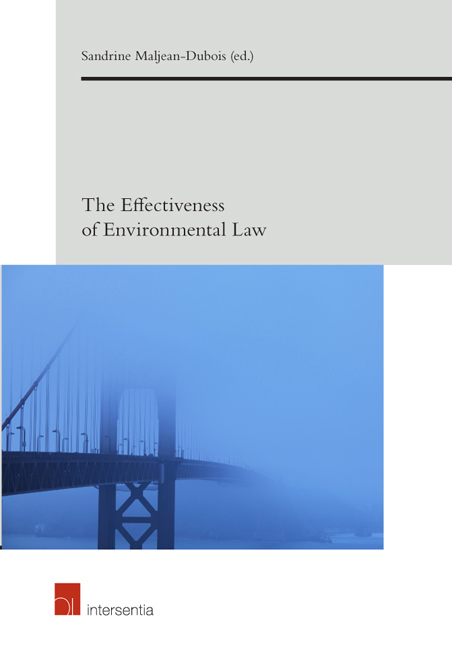Book contents
- Frontmatter
- Preface
- Contents
- Introduction. The Effectiveness of Environmental Law: A Key Topic
- Part 1 Measuring and Assessing Effectiveness
- Part 2 Improving Effectiveness
- Better Legislation
- Chapter 2 The Effectiveness of Payment for Ecosystem Services: a mix between a gradient model of public intervention and an effective normative framework
- Chapter 3 The Effectiveness of Environmental Law through Contracts
- Chapter 4 Legal Weaknesses and Windows of Opportunity in Transnational Biodiversity Protection: as Seen through the Lens of an Ecosystem Approach-Based Paradigm
- Chapter 5 Better Expertise through Institutional Linkages. The Case of the Mediterranean Basin
- Chapter 6 Environmental Dignity Rights
- Chapter 7 The Environmental Protection of Traditional Knowledge and the Active Participation of Indigenous Peoples in the Planning, Management and Decision-Making Processes as Means of Improving the Effectiveness of Environmental Law
- Chapter 8 Promoting Electricity from Renewable Energy Sources in France. Is French Law Appropriate for Achieving the Objectives?
- Chapter 9 Changing Patterns of International Environmental Law-Making: Addressing Normative Ineffectiveness
- Chapter 10 The Effectiveness of EU Nature Legislation: a long battle to secure supporting sectoral policies
- Better Implementation
Chapter 6 - Environmental Dignity Rights
from Better Legislation
Published online by Cambridge University Press: 27 September 2018
- Frontmatter
- Preface
- Contents
- Introduction. The Effectiveness of Environmental Law: A Key Topic
- Part 1 Measuring and Assessing Effectiveness
- Part 2 Improving Effectiveness
- Better Legislation
- Chapter 2 The Effectiveness of Payment for Ecosystem Services: a mix between a gradient model of public intervention and an effective normative framework
- Chapter 3 The Effectiveness of Environmental Law through Contracts
- Chapter 4 Legal Weaknesses and Windows of Opportunity in Transnational Biodiversity Protection: as Seen through the Lens of an Ecosystem Approach-Based Paradigm
- Chapter 5 Better Expertise through Institutional Linkages. The Case of the Mediterranean Basin
- Chapter 6 Environmental Dignity Rights
- Chapter 7 The Environmental Protection of Traditional Knowledge and the Active Participation of Indigenous Peoples in the Planning, Management and Decision-Making Processes as Means of Improving the Effectiveness of Environmental Law
- Chapter 8 Promoting Electricity from Renewable Energy Sources in France. Is French Law Appropriate for Achieving the Objectives?
- Chapter 9 Changing Patterns of International Environmental Law-Making: Addressing Normative Ineffectiveness
- Chapter 10 The Effectiveness of EU Nature Legislation: a long battle to secure supporting sectoral policies
- Better Implementation
Summary
ABSTRACT
The threats to human rights caused by environmental degradation – including those caused by climate change – are increasingly evident. And yet, there continues to be confusion and a lack of consensus about how human rights will be affected, as demonstrated at the recent climate talks in Paris. Taking better advantage of the role of constitutionally-instantiated dignity rights can help to diffuse this dissonance. Most of the effects that environmental degradation have on people can be seen in threats to their ability to live in dignity, including the ability to fully develop one's personality, to live in a community and to claim other rights. The right to dignity, though rooted in international law, is recognized in most of the world's constitutions and a robust jurisprudence of dignity rights has been developing in many countries. We conclude that environmental outcomes – including climate change – can and should be informed by dignity rights and corresponding jurisprudence, a synthesis we call “environmental dignity rights.”
“Man has the fundamental right to freedom, equality and adequate conditions of life, in an environment of a quality that permits a life of dignity and well-being, and he bears a solemn responsibility to protect and improve the environment for present and future generations.”
– Stockholm Declaration on the Human EnvironmentThe importance of dignity as a founding value of the new Constitution cannot be overemphasized. Recognizing a right to dignity is the acknowledgement of the intrinsic worth of human beings: human beings are entitled to be treated as worthy of respect and concern.
– S v. Makwanyane and Another, Constitutional Court of South AfricaINTRODUCTION
Environmental outcomes can and should be informed by the concept of dignity. Human dignity is an elemental value that presupposes that every human being has equal worth. It emphasizes the fundamental value and equality of all members of society – humans are not only endowed with dignity, but each is endowed with an equal quantum of dignity. In the words of the United Nation's Declaration on Human Rights, “All human beings are born free and equal in dignity and rights.” Where dignity is recognized, each person's dignity is inalienable, irreducible and infinite.
- Type
- Chapter
- Information
- The Effectiveness of Environmental Law , pp. 125 - 148Publisher: IntersentiaPrint publication year: 2017
- 3
- Cited by

